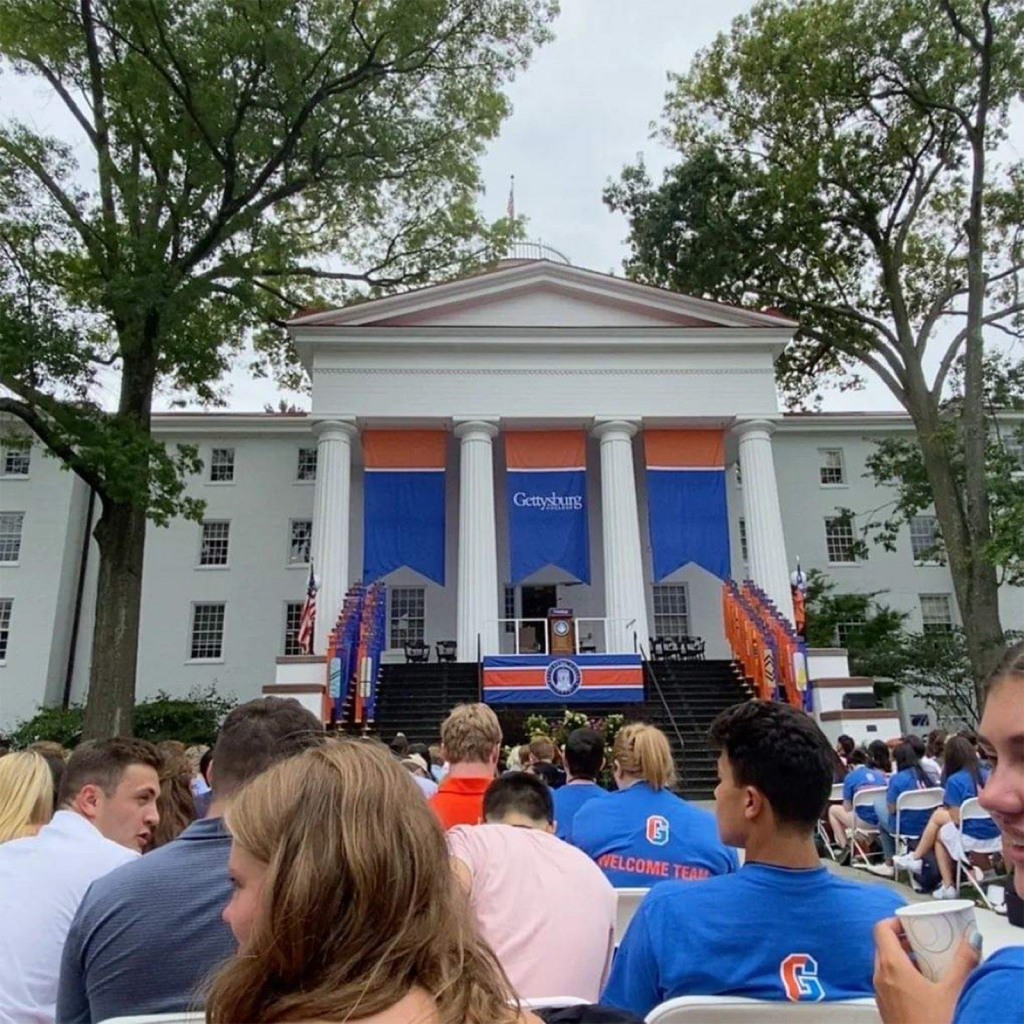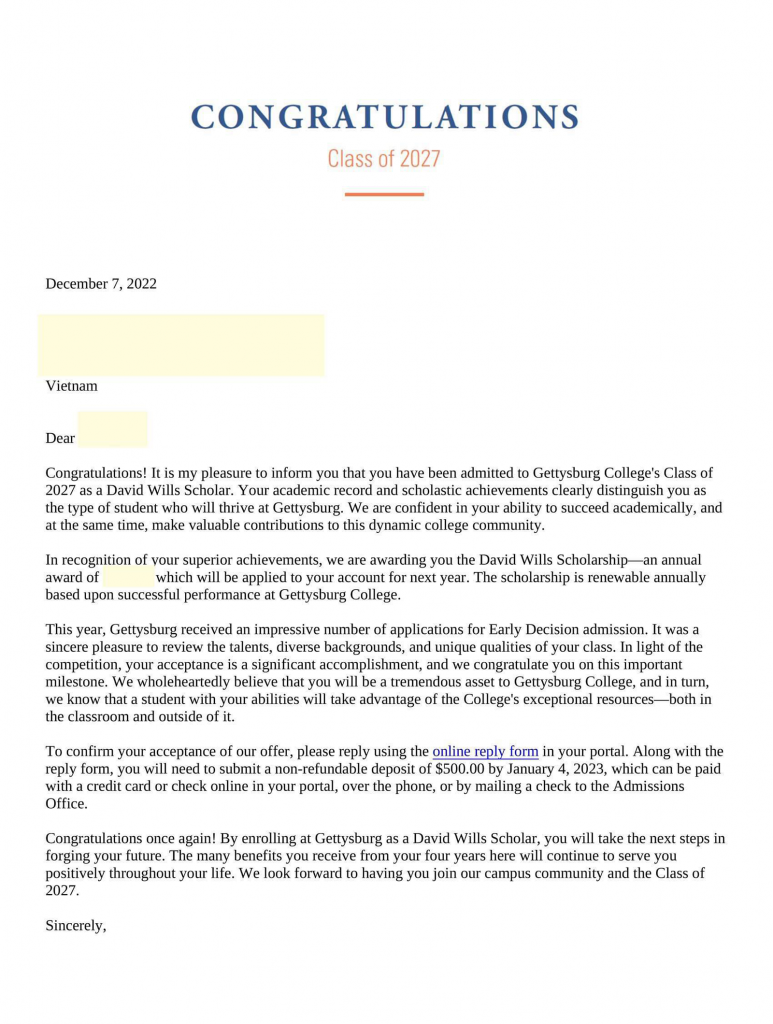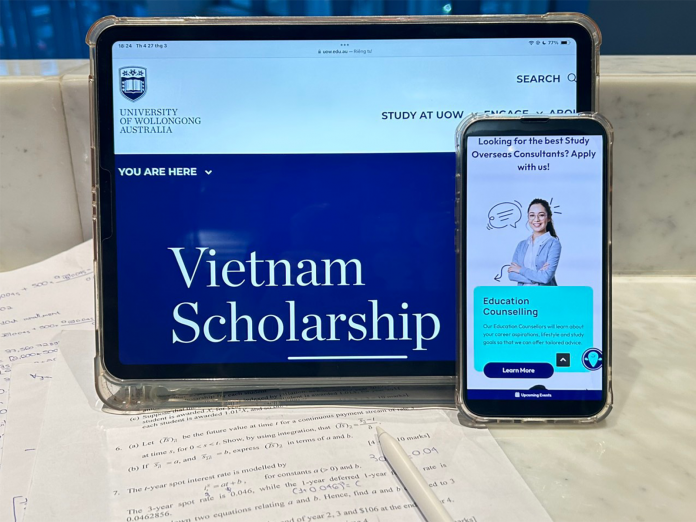Vietnamese students are turning to agencies to secure scholarships for overseas studies.
By Chloe Nguyen
To realise her dream of studying abroad, Nguyễn Hương Trà* had to rely on an agency to help with her university admission and scholarship.
“My family spent 100 million Vietnamese dong (US $4,028.08) for a one-on-one mentoring service for me to apply to nine U.S. colleges,” she says.
This fee is 12 times the average monthly salary in Vietnam in 2023, which is 7.9 million Vietnamese dong (US $318.22), according to figures from the Ministry of Labour, Invalids and Social Affairs.
But the return was good, since she followed the advice given to her and was admitted to Gettysburg College in December 2022 with a HK$1,033,051.80 (US $132,000) scholarship in total.
“Studying abroad has always been my childhood dream because I want to go to school in a developed country and experience different cultures,” the business-major student says.
The first-year student says the agency worked with her for one and a half years, starting when she was in grade 10 until she received admission and scholarship results in December 2022.

Consultants from the agency looked through her profile and advised her on how to polish it such as by taking the Scholastic Assessment Test (SAT) and the International English Language Testing System (IELTS) test, joining extracurricular activities focusing on leadership, and joining competitions about solving business problems.
“They guaranteed that I can get into the top 50 U.S. liberal arts colleges by following their plan,” Nguyễn says.
“Without the scholarship, my family cannot afford my study in the U.S. because tuition fees for international students and living expenses are very expensive. It costs about HK$626,092 (US $80,000) a year at Gettysburg,” the 18-year-old student says.
She adds that her family’s monthly household income is 40 million Vietnamese dong (US $1,611.23).
Nguyễn admits she was clueless about what to do to secure a scholarship and could not handle all the complicated application documents without outside help.
“The agency’s service fee is high but it is worth it when compared with the amount of scholarship I got”, she says.
In 2023, there were more than one million high school graduates in Vietnam. 494,488 of them continued their studies in Vietnam and about 40,000 of them studied abroad, according to the Ministry of Education and Training of Vietnam.
The number of Vietnamese students studying in the U.S. jumped from 18,722 in the academic year 2014/2015, to 24,392 students in 2018/2019, figures from the Institute of International Education show.
Hồ Trung Thành, a student at the University of Wollongong in Australia, also resorted to an agency’s service when applying to three universities in the country.
“I spent 25 million Vietnamese dong (US $1,007.02) on the agency’s service. I wrote an application, they reviewed it and filed it to universities on my behalf,” he says.
“My family is willing to spend that amount for me to study because they want me to work in Australia after graduation and earn permanent residency (P.R.). Having P.R. helps me find jobs easier because the company does not need to sponsor my work visa which costs a lot of money and requires paperwork,” Hồ adds.

Hồ wants to work in Australia because he dislikes the working environment in Vietnam.
“Most companies there have a culture of working overtime and on weekends. Salary is much lower compared to Australia, where work-life balance is much better,” he says.
The student majoring in communication and media points out that his major is on Australia’s priority migration skilled occupation list so it is easier for him to earn P.R.
He admits that applying through an agency is faster than applying on his own because the agency has a partnership with the universities he applied to.
“I received admission and scholarship results only two weeks after application submission, while applicants without help from agencies waited for three months,” the 18-year-old student adds.
Đinh Thị Thanh Hoa, who has been running a study consultancy agency for seven years, observes that there is an increasing number of students seeking scholarships to go abroad.
Đinh reveals from 2017 to 2019, she only had 287 students, but the number rocketed to 3,000 in 2023.
“Many Vietnamese students want to study overseas, but most of them do not have enough financial capacity, so they need to apply for scholarships,” Đinh explains.
“One-on-one mentorship has the highest success rate of students getting a scholarship. That costs 16 million Vietnamese dong (US $644.49) per application,” Đinh says.
She stresses mentors do not write applications for students, they only give students guidance.

Lê Đình Hiếu, a PhD candidate in education at Johns Hopkins University, observes there are 700,000 Vietnamese secondary school final-year students researching or applying to study abroad every year.
“But only about half of these students make it,” he says.
Lê says students want to study abroad for many reasons such as to find better jobs, experience multicultural environments, and immigrate.
The former director of admissions at Vin University in Vietnam conducted surveys on over 5,000 Vietnamese families and found that they wanted to seek high-quality education that was not easily found in Vietnam.
“About 60 per cent of the families polled who send their children abroad want them to settle down in that country,” the educator says.
“Around 10 to 15 per cent of students I talked to want to study abroad because of peer pressure. Friends around them study abroad so they also want to do it or else they feel they are not doing better than others. But half of them cannot afford to do so,” Lê adds.
He points out average income in Vietnam is low compared to developed countries and the cost of studying overseas is expensive.
Lê says one way to reduce the cost is to apply for a scholarship.
“There is no shortcut, no predefined path, and no universal formula for students in applying for scholarships,” he adds.
*Name changed at interviewee’s request.
Edited by Nutcha Hunsanimitkul







































